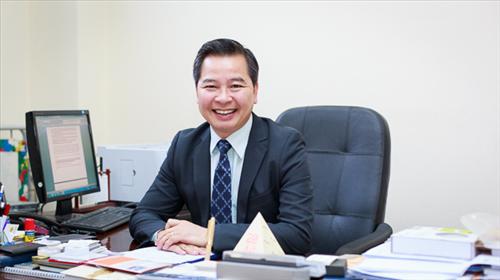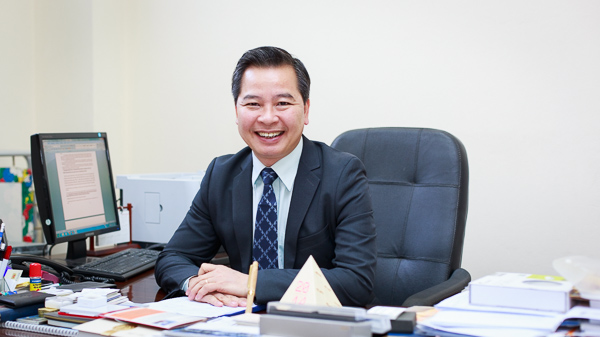

Associate Professor, Dr. Pham Quang Minh. (Photo: Thanh Long/USSH)
Reporter: Assoc. Prof. Dr. Pham Quang Minh, it is known that in recent years, the University of Social Sciences and Humanities has achieved important achievements in the field of scientific research. As Vice Rector in charge of scientific research, could you tell us about the outstanding achievements in scientific research of the University in 2013?
Associate Professor, Dr. Pham Quang Minh:Scientific research is one of the two most important areas among the tasks of any university. Currently, all universities in the world are striving to focus on building their resources to become research universities. In recent years and at present, the University of Social Sciences and Humanities has been promoting the strength of a basic research university, promoting the comprehensive capacity of all lecturers, researchers, graduate students and students. The results can be summarized in three numbers: the number of scientific research topics, the number of seminars and the number of publications. In 2013, the University had a total of 85 scientific research topics of all kinds, of which 12 were national-level topics, the rest were group A and group B topics of the National University, topics of the City Department of Science and Technology, of the Nafosted Fund... Also in 2013, the University successfully organized 38 seminars and talks at all levels, of which 23 were international seminars. Many conferences have created a great resonance and are highly appreciated such as: "Paris Agreement - 40 years in review" in collaboration with the Institute of Military History, French Ministry of Defense; "Vietnam in world history" in collaboration with the World Historians Association and Hawaii Pacific University (USA); "Choosing Left-wing theories in a changing world" in collaboration with the Rosa Luxemburg Institute (Germany); "Social media, classical media and public opinion" in collaboration with the Konrad Adenauer Institute (Germany)... On that basis, in 2013, the School's staff published a total of 642 domestic and international articles, 37 textbooks, monographs, references, and lookups. Most notably, the number of international articles published in the 4 years from 2010 to 2013 increased significantly in both quantity and quality. Specifically, if in the 2009-2010 school year there were only 7 articles by the school staff published abroad, then in the 2010-2011 school year there were 11 articles; in the 2011-2012 school year there were 18 articles and in the 2012-2013 school year there were 21 articles. Notably, out of 21 international publications in the 2012-2013 school year, 6 articles were published in ISI journals, which are journals with high citation indexes and international scientific influence.
In addition, the School continues to build and maintain 28 strong research groups. 30% of students regularly conduct scientific research and have won many awards from the Ministry of Education and Training and Hanoi National University. In 2013, there were 831 scientific research reports by students.
Thus, in general, it can be seen that the scientific research activities of the School in the past year were relatively rich, diverse and are growing stronger and stronger.
PV:Last year the School also successfully organized many international cooperation programs. Could you please tell us about some important milestones in the field of international cooperation of the School in 2013?
Associate Professor, Dr. Pham Quang Minh: It can be said that with its prestige and international cooperation capacity in recent years, the University of Social Sciences and Humanities has successfully organized many international cooperation programs with universities and research institutes around the world. By the end of 2013, the University of Social Sciences and Humanities had signed 180 memorandums of understanding and cooperation with universities and research institutes around the world, including many prestigious and highly ranked universities such as Peking University (China), Tokyo University (Japan), Seoul University (Korea), Humboldt University (Germany), University of California (USA), Mahidol University (Thailand)... In particular, in 2013, the University signed a cooperation agreement with the Institute for Global Engagement of the United States, one of the world's leading research institutes on religion, and organized a conference in Washington DC on religious issues in Vietnam. Together with the Institute for Global Engagement, the School organized two training courses on religion, the rule of law and religion in Hanoi and Ho Chi Minh City with the participation of hundreds of students.
In 2013, through various forms, foreign partners supported 2 billion 837 million VND for the scientific research activities of the University, accounting for 17.58% of the total budget for scientific research activities. Each year, the University sends about 100 staff and students to research, teach and study abroad and also welcomes about 100 foreign staff and students to work and study. In particular, last year the University had the honor of welcoming the Prime Minister of East Timor and the Prime Minister of China to visit and talk with staff and students.
However, besides the success, scientific research and international cooperation still show some limitations. That is, the School still does not have many research projects in coordination and joint implementation with foreign partners and scholars. The School has not effectively exploited all signed cooperation documents. Financial resources, language barriers and the mentality of the subsidy period are the main reasons leading to the limitation in the School's international cooperation.
PV: In 2014, Vietnam's cooperation activities with countries in the region and the world are expected to be vibrant. What is your assessment of the prospects for expanding international cooperation and developing international scientific research activities of the University?
Associate Professor, Dr. Pham Quang Minh: The trend of increasing international cooperation between Vietnam and the world and other countries is certain because the world economy is forecast to grow by 3.5%. Major economies such as the US, Japan and countries in the EURO area have recovered after the global financial crisis in 2008. Vietnam's international cooperation will certainly be very vibrant and promise many good results. In the field of education and training, Vietnam and its partners will also further promote the internationalization of education through increasing the exchange of teachers and students, documents, textbooks, diversifying forms of cooperation and there will be more joint training programs such as 2+2, 3+1 or distance learning, online, or short-term programs.
For the University of Social Sciences and Humanities, 2014 also promises to be a successful year with many important international cooperations. Right in the first days of the year (from January 9-10, 2014), the University of Social Sciences and Humanities has initiated with Hong Ha Academy (Yunnan, China) to establish the Association of Universities in the Red River Basin to enhance scientific exchanges and cooperation between universities in the Red River Basin located in Yunnan province and Northern Vietnam for the sustainable development of the community. Next, in Paris from January 16-18, 2014, the University cooperated with Sorbon University, the Institute of Military History of the French Ministry of National Defense to co-organize the International Conference "France, the European Union and Vietnam since 1954 to present" within the framework of the Vietnam Year in France. On January 22, 2014, the School cooperated with George Washington University to successfully organize the international conference "Perspectives on Nuclear Energy in Asia".
In 2014, the School also plans to organize about 20 international conferences on various topics, notably conferences on the Trans-Pacific Partnership Agreement (TPP) with RLS Institute, Vietnam's participation in the United Nations Peacekeeping Force with FES Institute (Germany) and SIPRI (Sweden), "Dien Bien Phu - 60 years in review from the perspective of international relations", "The role of the École Française d'Extrême-Orient (EFEO) in the development of Vietnamese social sciences"... with Sorbon University and the French Embassy...
PV: To implement the above projects and achieve good results, what solutions has the School proposed, Associate Professor?
Under the direction and support of VNU, the Ministry of Science and Technology and relevant ministries and branches, the scientific research activities of the University of Social Sciences and Humanities have had many important changes in both organization and management. The University will actively and proactively propose and implement scientific activities and international scientific cooperation, review current regulations, regularly inspect assigned tasks, and at the same time, seek the support of Party, Government, National Assembly and some localities to implement major projects and plans.
In addition, the University will pay more attention to the investment mechanism for large, interdisciplinary scientific research tasks; issue appropriate reward and discipline regulations such as rewarding topics completed on time, achieving good results, international publications and converting scientific research tasks into working hours to evaluate annual labor. This mechanism has been and is being highly effective. The lesson learned is to truly consider basic research as an indispensable task of a university lecturer, to enhance autonomy and self-responsibility while encouraging scientists to be enthusiastic about research.
Thank you very much, Associate Professor!
Author:Nguyen Hang
Newer news
Older news